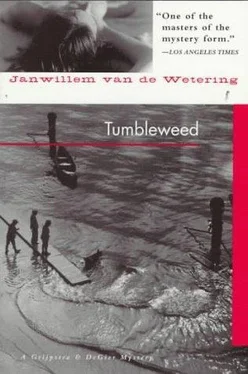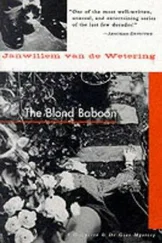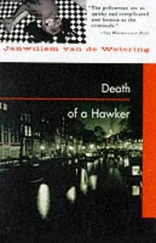Janwillem De Wetering - Tumbleweed
Здесь есть возможность читать онлайн «Janwillem De Wetering - Tumbleweed» весь текст электронной книги совершенно бесплатно (целиком полную версию без сокращений). В некоторых случаях можно слушать аудио, скачать через торрент в формате fb2 и присутствует краткое содержание. Жанр: Полицейский детектив, на английском языке. Описание произведения, (предисловие) а так же отзывы посетителей доступны на портале библиотеки ЛибКат.
- Название:Tumbleweed
- Автор:
- Жанр:
- Год:неизвестен
- ISBN:нет данных
- Рейтинг книги:4 / 5. Голосов: 1
-
Избранное:Добавить в избранное
- Отзывы:
-
Ваша оценка:
- 80
- 1
- 2
- 3
- 4
- 5
Tumbleweed: краткое содержание, описание и аннотация
Предлагаем к чтению аннотацию, описание, краткое содержание или предисловие (зависит от того, что написал сам автор книги «Tumbleweed»). Если вы не нашли необходимую информацию о книге — напишите в комментариях, мы постараемся отыскать её.
Tumbleweed — читать онлайн бесплатно полную книгу (весь текст) целиком
Ниже представлен текст книги, разбитый по страницам. Система сохранения места последней прочитанной страницы, позволяет с удобством читать онлайн бесплатно книгу «Tumbleweed», без необходимости каждый раз заново искать на чём Вы остановились. Поставьте закладку, и сможете в любой момент перейти на страницу, на которой закончили чтение.
Интервал:
Закладка:
The car found the dip and the commissaris drove her off the road and switched the engine off and got out. He sat down on a rock and closed his eyes.
"The real thing," he said aloud, "not the perversion." To hurt is the perversion, he thought. So the real thing would be to cure, to restore.
He tried not to think but to feel the trees around him but his mind refused to become calm. He lit a cigar and got back into the car.
He was driving close to the coast and he could hear the sea raging against the cliffs. The forest had given way to the cunucu again, the dried-out veld with thornbushes. An occasional car passed or met him but nothing else moved, except the few cabryt goats tearing at dry plants, and once he had to slow down suddenly for a large lizard which scuffled across the road and gave him an angry look from its heavily lidded eyes.
He had to be close to Shon Wancho's place now and he stopped near a hut. The black woman who had come to the door gave him directions in slow pure Dutch. He thanked her and lifted his hat, and her answering smile was kind and puzzled.
The road didn't go to the house and he had to walk the last half mile until he came to the cliffs.
When he finally found the tall thin black man he felt very hot and his suit stuck to his skin.
"Good afternoon, Shon Wancho," the commissaris said, and took off his hat.
When, later, he tried to remember, to rebuild their meeting he found the task to be impossible. He tried often, he always failed.
There had been, and that seemed to be the main difficulty which made fun with his memory, no real conversation. Shon Wancho hadn't answered a single question, and after a while the commissaris had stopped asking questions. The experience was weird. As a police officer he had been trained to create situations. The other party, whether suspect or witness, had always been at some considerable disadvantage. He had always managed to trick his opponents, playing on their fear, on their sense of self-importance. And they had talked. Never once had the commissaris failed. He had cornered his opponents, threatened and flattered them. And they had talked. Never once had the commissaris failed. He had cornered his opponents quietly, by being polite to them, by making a little statement or asking a little question. They had been frightened of going to jail, of losing their reputation. They had been jealous and tried to incriminate others. They cared.
But Shon Wancho didn't care. When the commissaris found him the old man had been working in his garden tending a creeping plant with delicate yellow flowers. The garden was next to a small house, a neat building consisting of two rooms and a covered porch, supported by strong beams which looked as if they had been found on the beach, bleached by a hundred years of sun. Shon Wancho had met his guest, treating the commissaris as if he were a small tired hot child. He had been shown where he could wash his face and hands, had been given some cool fruit juice to drink and directed to a rocking chair in the shadow of the porch from which he could see the flowers of the garden. There had been no need to explain the purpose of his visit. The commissaris had tried but his sentences broke halfway. The quiet half-closed eyes of the thin elegant black man expressed a peaceful lack of interest in the prattling of a distracted mind. He neither answered nor acknowledged the questions of the commissaris but stood silently, leaning against a bleached beam. The commissaris became irritated and began to repeat himself, his words stumbled over each other, he felt as if he were trying to press against something which wasn't there, but at the same time he felt some response in his own mind, as if the tall Negro were right. Nothing had happened so what was the police officer fretting about? He began to pay attention to the silence of his host. He saw Shon Wancho's face now, the small pointed beard, the high cheekbones, the thick arching lips framing the wide mouth, and the aquiline nose, the face of a chief, of a nobleman.
"This man needs nothing," the commissaris' mind was saying to itself and a small surge of approval moved through his thoughts.
"No, not a chief," he was thinking now. "A chief needs a tribe. And a nobleman needs his rank."
His attempts at trying to place the man failed. And suddenly he felt that he no longer cared either. The quietness of Shon Wancho was too strong and he surrendered to it. Shon Wancho had stopped looking at the commissaris. He sat down on a low stool, close to the rocking chair. His back was erect and his gaze steady; he was looking ahead now, at the garden and the distant sea.
Together they underwent the sudden explosive sunset of the tropics; the bursting colors, the wide space of the endless view, and the cool powerful sound of the sea combined to knock away the last support of the busy-ness of the commissaris' mind so that he reached a state of awareness where he was neither awake nor asleep.
After a while he found his hat and put it on and left, and before he left Shon Wancho had lightly touched his forearm and smiled.
"So what did you find out?" the commissaris kept on asking himself as he drove back to Willemstad. "What did you find out?'
There was a final visit to make. He stopped near a public callbox and dialed Mr. de Sousa's number.
Mr. de Sousa answered the phone himself.
"Yes, commissaris," Mr. de Sousa said. "Chief-Inspector da Silva told me you would be calling."
"I would like to come and see you," the commissaris said.
"Tomorrow?"
"No. Tomorrow I should be on my way back to Holland. Unfortunately I am rather pressed for time. If it isn't inconvenient for you I would like to come and see you right now. According to my map I am very close to your house. I should be able to see you within a few minutes."
"You will be welcome," Mr. de Sousa said and rang off.
The commissaris found the house, a palatial home built on a small hill with a driveway lined with palm trees. Mr. de Sousa opened the car door and led the way.
The house breathed wealth. The corridor was wide and high and there were potted plants and pieces of sculpture and oil portraits of men who looked like plantation owners, dressed in riding breeches and holding whips, and of ladies with elaborate hairstyles and stiff lace dresses.
As they walked to Mr. de Sousa's study a servant scuffled behind them carrying a silver tray with bottles and glasses. Polite phrases filled ten minutes before the commissaris could mention the name of Maria.
"Yes," Mr. de Sousa said, and the folds of his face trembled. "My daughter. She is dead."
The commissaris found that it had become impossible to ask questions. He waited.
"I refused her presence," Mr. de Sousa said, and began to wipe his wet face, "my own daughter, the cleverest, the most beautiful of them all. I wouldn't have her in my own house. I disapproved. I had to disapprove. Do you understand, commissaris of police, do you understand?"
The commissaris drank his whisky, the silence of Shon Wancho was still around him and some of it reached the fat rich man and calmed him a little.
"Perhaps you understand. Perhaps you have children of your own. But Europe is different. I have been to Europe, many times. I am a wealthy man, I do big business. I know the beautiful women of Europe, I have paid them money and they have given me experiences which I will never forget. I am grateful to those women. But my own daughter became one of them and that I couldn't accept."
Mr. de Sousa filled the commissaris' glass and fussed with the ice cubes and the water and the silver stirring spoon.
"But I am her father and perhaps I should have accepted. As a child she always came to me and talked to me and we were together. She was a wise child and I learned from her as we walked through the island. I took her to the other islands, the Dutch islands and the English islands and some of the French. I even took her to Haiti, she wanted to go to Haiti. She was partly black and she was very interested in her blackness and Haiti is a black country. I always thought that a father teaches his child but Maria taught me. Her voice was very quiet and when she spoke I listened.
Читать дальшеИнтервал:
Закладка:
Похожие книги на «Tumbleweed»
Представляем Вашему вниманию похожие книги на «Tumbleweed» списком для выбора. Мы отобрали схожую по названию и смыслу литературу в надежде предоставить читателям больше вариантов отыскать новые, интересные, ещё непрочитанные произведения.
Обсуждение, отзывы о книге «Tumbleweed» и просто собственные мнения читателей. Оставьте ваши комментарии, напишите, что Вы думаете о произведении, его смысле или главных героях. Укажите что конкретно понравилось, а что нет, и почему Вы так считаете.












